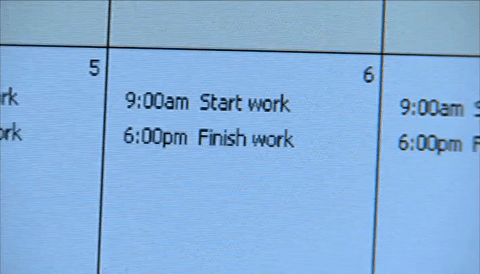No matter what year you are in college, getting through the first month of the semester is an achievement. You read the syllabus many times and have not gotten overwhelmed with too much work (hopefully) as you begin adjusting to the schedule. However, there is one thing that causes more stress to students than homework, sports, and campus dining combined. Midterms can be an obstacle in the path toward success. Here are some strategies that students can use to get through this difficult time of the semester.
1. Write important dates, information, and events on a calendar

College students feel overwhelmed by the number of midterms they have each semester. Organizing dates of assignments and activities are crucial in preparing for exams. You can buy a calendar, planner, or use your phone to stay on track. Knowing the days and times of midterms will ease frustrations and allow you to put in extra time to study.
2. Make healthier food choices

Make sure to take breaks between study sessions (whether you are alone or with a group of friends) and get something good to eat. There are many dining options on campus, but if the food is not to your satisfaction (and it most likely will not be) try searching elsewhere. Chicken, eggs, and fish are your best options. Refrain from eating junk food (that means McDonald's and other fast food). If you want to improve your memory and excel on your midterms, you need to fuel your brain.
3. Go to the gym for a quick workout

Learning and eating the right kind of foods is great for improving your mind, but do not forget about your body. Physical activity has multiple benefits as well, so it's important to maintain a healthy lifestyle. You can either go alone or bring a friend to the gym. Try to do some basic exercises like running, push-ups, cycling, and stretching. If you want to listen to your playlist while working out, jump on a treadmill or elliptical, and put on your headset to eliminate both calories and stress.
4. Be sure to get enough sleep

Midterms are stressful, but staying up all night studying will not help. You need the strength to take your exams, which is why it's important to get plenty of rest (8 hours) every night. Finding the time to take 15- to 30-minute naps during the day is good as well. Avoid distractions, staying out late, and drinking alcohol. By enrolling in a course (especially one that you need to take and pass) you made a commitment to try and do well, so after a few hours of studying and fun, get the rest you need.
5. Talk to other students about forming a study group

If you are not already part of a study session, there are other students in your class learning the same material, but their studying techniques might be different than yours. Make the time to ask a few classmates if they want to form a study group. You will learn about the best places on campus to do work, develop study habits, and make new friends in the process.
6. Search for quiet locations to study on campus

Besides the library, there are many locations to complete homework assignments and study for exams. Find an area with computers or if you want to stay away from distractions, check out the various buildings around campus and find a quiet spot to study with your friends.
7. Do brain exercises or games

Whenever you have free time away from studying or taking a quick break, spend 10 to 20 minutes doing activities to improve your memory. Some examples include puzzles, memory games, or scrabble. You can download apps to train your brain as another option or read an interesting book (yes, ebooks count) if you want to switch it up. If you are in a study group, quiz each other on exam topics to find out how much information you already know and what you need to review again.
8. Have snacks and coffee available

College students get hungry while studying. Have snacks with you instead of interrupting your session and running out to get a meal. Keep it to a minimum (popcorn or pretzels) though. Coffee is good for staying awake during the day, but do not drink coffee if you are studying at night to avoid bouncing off the walls of your dorm while spitting out random facts.
9. Participate in clubs and other activities

When college students are not in class, sleeping, or eating, you will find them participating in clubs on campus. Being involved both on and off campus and taking some time (at least once or twice a week) to assist a club is beneficial for your body, mind, and soul. Joining a club will help you to become more relaxed and it will take the stress away from exams, which will, in turn, result in you doing better on your midterms and classes.
10. Speak to your professors during office hours

If you talk to your professors outside of class, you will not get the answers to your midterm exams, but you can ask questions relating to homework assignments or projects. Your professors will tell you to read over specific chapters and focus on key terms. Having additional knowledge about class lectures and topics that you did not understand will give you an advantage and idea on what to study for your exams.





 mr and mrs potato head
StableDiffusion
mr and mrs potato head
StableDiffusion










